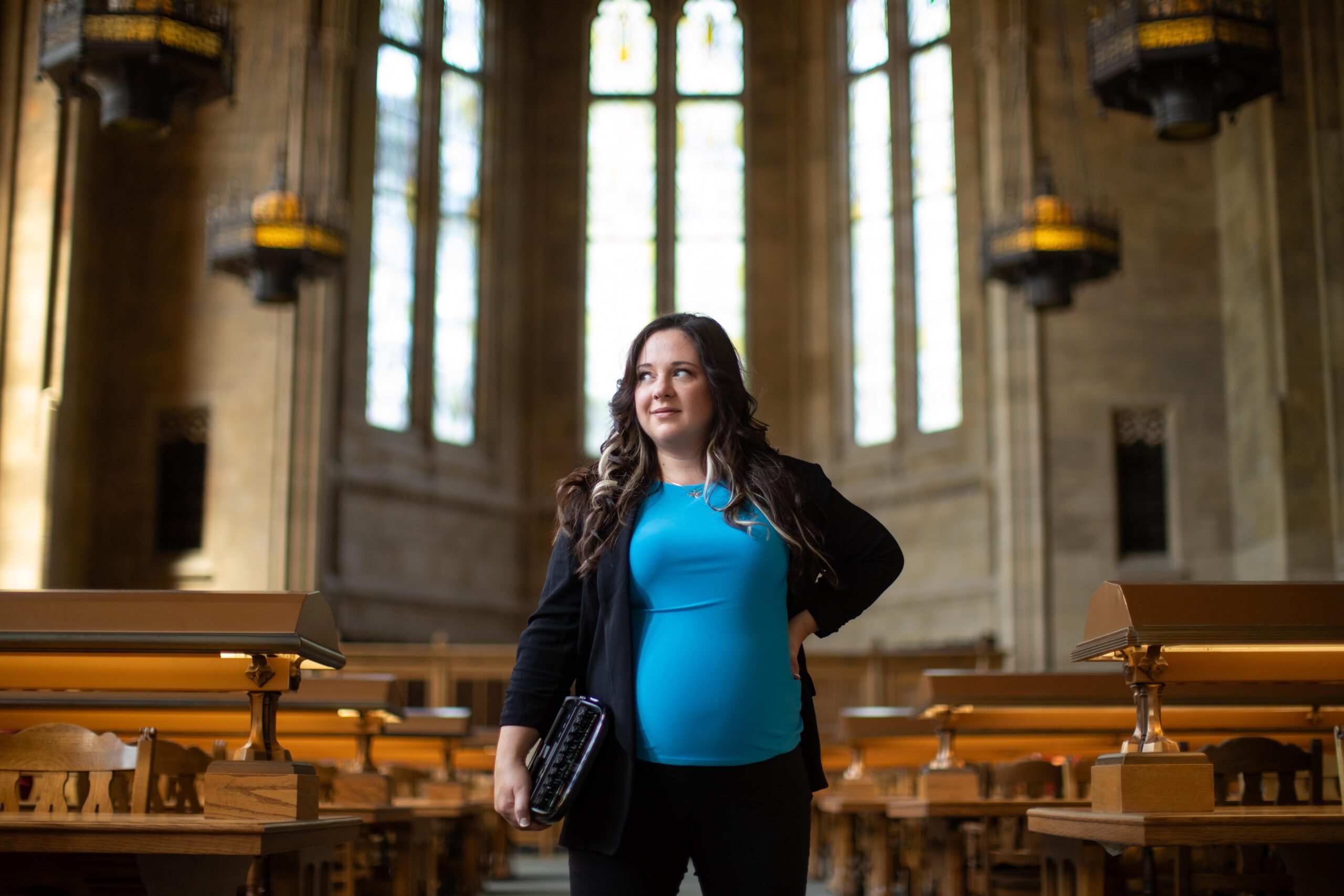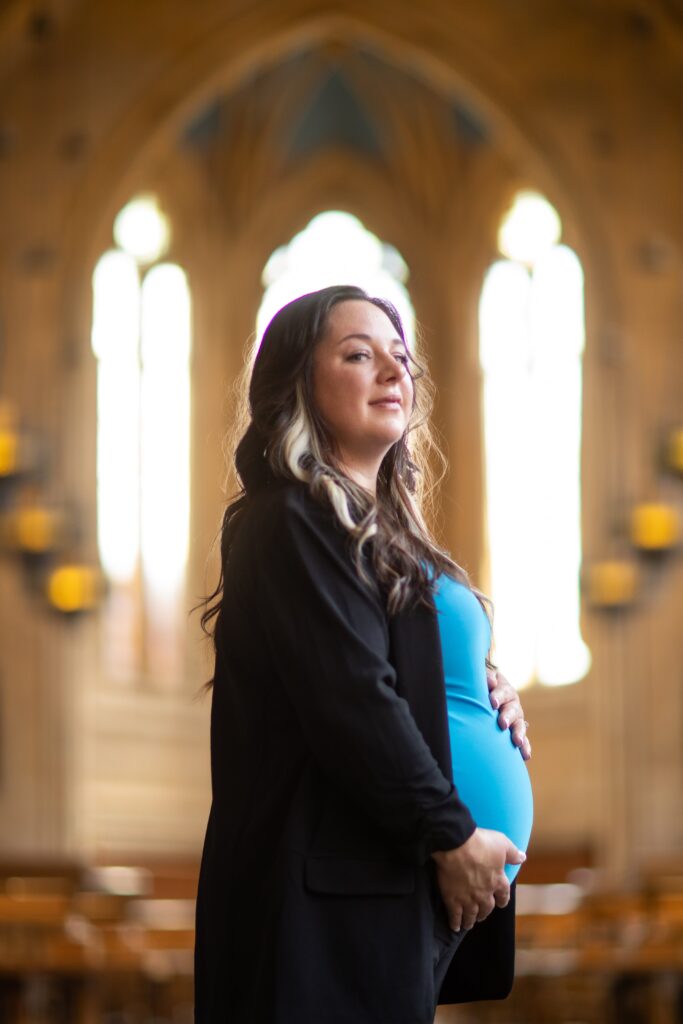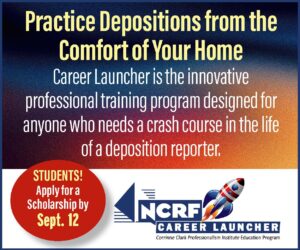By Tevin Green
Although she felt she had to “play the part of a confident court reporter” her first day on the job, Sierra Zanghi, RSR, a freelancer in Bothell, Wash., has now fully embraced the role. As a busy reporter, volunteer, and mother, Zanghi says she appreciates the flexibility the profession provides. “I love that this career has given me that holy grail: A work-life balance.”
JCR | What do you enjoy most about court reporting?
SZ | In my previous life as an actor, I fancied myself a teller of stories; as a court reporter, I am a keeper of stories. Every day is an opportunity to preserve someone’s truth, and you never know what drama awaits you in the room each day.
JCR | How did you feel both going into your first assignment as a reporter and coming out of it?
SZ | My first time flying solo, my adrenaline was through the roof. I was so afraid I’d belly flop and mess something up somehow. I leaned on my acting background and decided I’d just play the part of a confident court reporter with years of experience behind her. It worked! The next thing I knew the job was over and I’d fooled them all, including myself. Not long thereafter that faux confidence became real confidence.
JCR | What do you do to remain positive and motivated?
SZ | One of the first things I did as a new reporter was to upgrade my memberships with both my state association and NCRA and sign up to serve on committees in both. Being involved with the associations as both a student and as a new professional has allowed me to rub elbows with the best and brightest in the profession, expanding my network of mentors and collaborators. After each meeting or conference, I feel fresh inspiration to be the best that I can be.
JCR | What’s the coolest experience you have had working in the profession?
SZ | We speak Italian at home, which a scheduler friend knew, so I was brought in for a unique assignment working with both Italian and U.S. investigators. There was only one interpreter in the room but up to 12 investigators and counsel on any given day. I was able to help translate during breaks and had an absolute blast getting a peek into Italian jurisprudence. I hope to have a lot more international jobs, especially the kind that allow me to travel.
JCR | What was the hardest part of transitioning from school to the real world?
SZ | All of the back-end business processes of freelancing are labyrinthine at best. A few of us who certified together still have a group chat where we help each other navigate the uncharted waters of working life. With their help I registered as an LLC, untangled the web of taxes and regulations, and even opted into a new state-run Family and Medical Leave coverage which is now providing me with 16 weeks of maternity leave. Mentors are an indispensable resource, but don’t underestimate the strength of your fellow students and new reporters who are walking through the same fire you are and may have the answer you’re looking for right at their fingertips.
JCR | Do you have a mentor?
SZ | I collect mentors! No one will ever have all the answers, and I’ve found it beneficial to have a Rolodex of people I can call depending on the circumstances. You should have a mentor for steno, one for procedures, one for business practices, one for technology, one for managing a healthy work-life balance, and more for second opinions. That way you’ll never feel like you’re leaning too hard on any one person for advice.
JCR | What was the best piece of advice you received from another court reporter that helped you?
SZ | “Know your worth and do not settle for less.” Women especially have historically had a hard time negotiating for fair pay, but it’s never wrong to advocate for yourself. Undercutting the prevailing wage devalues your own work and the work of your fellow reporters. Analyze the rates in your area, adjust for experience, and trust that your hard-fought skills are worth every penny.
JCR | What is the next goal in your career?
SZ | While I’m aware that the RSR is an entry-level certification, I am deeply grateful that my state offers reciprocity for it. Rather than continuing to focus all my energy on testing, which had given me paralyzing test anxiety, I was able to start my career and focus on honing the myriad other skills of the job, engage meaningfully with the associations, and provide for my family. But as imperfect as tests are as a measure of the full range of skills necessary to be a reporter, they are our best metric for the skill of stenography, and they matter. I look forward to finishing my RPR and eventually hope to obtain my CRR and RMR.
JCR | What do you love about your career?
SZ | My uncle, a celebrated journalist, always had a framed photo of his wife and daughter on his desk inscribed with the words “Remember who you really work for.” As much as I love my new vocation, one of the main things that drew me to this profession was the flexibility. In my first year and a half, I’ve worked hard putting in long days and weeks, but I’ve also taken vacation, bereavement leave, and now maternity leave, all on my own schedule. I love that this career has given me that holy grail: A work-life balance. I hope never to forget what and who I work for.
Tevin Green, RPR, is a freelance reporter based in Portland, Ore. He can be reached at tevinsongreen@gmail.com.
Sierra Zanghi, RSR, is a member of the NCRA STRONG Committee and a freelance reporter based in Bothell, Wash. She can be reached at sierra.zanghi@gmail.com.






